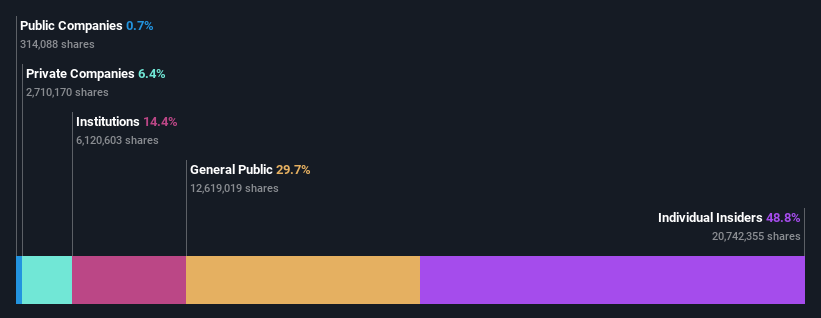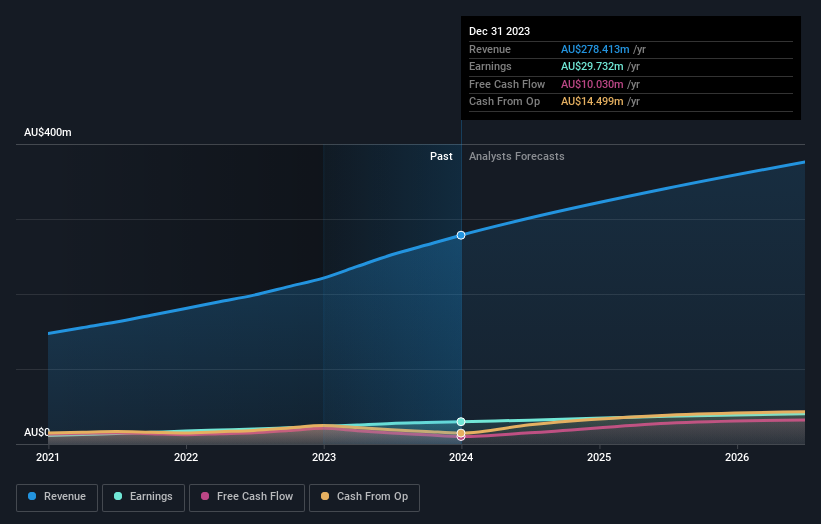Despite recent sales, Supply Network Limited (ASX:SNL) insiders still hold the largest share with a 49% interest
Key Insights
Significant insider control over Supply Network implies vested interests in company growth
A total of 5 investors have a majority stake in the company with 53% ownership
A look at the shareholders of Supply Network Limited (ASX:SNL) can tell us which group is most powerful. We can see that individual insiders own the lion's share in the company with 49% ownership. In other words, the group stands to gain the most (or lose the most) from their investment into the company.
And insiders own the top position in the company’s share registry despite recent sales.
Let's delve deeper into each type of owner of Supply Network, beginning with the chart below.
See our latest analysis for Supply Network
What Does The Institutional Ownership Tell Us About Supply Network?
Many institutions measure their performance against an index that approximates the local market. So they usually pay more attention to companies that are included in major indices.
Supply Network already has institutions on the share registry. Indeed, they own a respectable stake in the company. This implies the analysts working for those institutions have looked at the stock and they like it. But just like anyone else, they could be wrong. When multiple institutions own a stock, there's always a risk that they are in a 'crowded trade'. When such a trade goes wrong, multiple parties may compete to sell stock fast. This risk is higher in a company without a history of growth. You can see Supply Network's historic earnings and revenue below, but keep in mind there's always more to the story.
Hedge funds don't have many shares in Supply Network. The company's largest shareholder is Harry Forsyth, with ownership of 25%. With 11% and 6.4% of the shares outstanding respectively, Peter McKenzie and Dixson Trust Pty Limited, Asset Management Arm are the second and third largest shareholders. In addition, we found that Geoffrey David Stewart, the CEO has 1.7% of the shares allocated to their name.
To make our study more interesting, we found that the top 5 shareholders control more than half of the company which implies that this group has considerable sway over the company's decision-making.
Researching institutional ownership is a good way to gauge and filter a stock's expected performance. The same can be achieved by studying analyst sentiments. There is a little analyst coverage of the stock, but not much. So there is room for it to gain more coverage.
Insider Ownership Of Supply Network
While the precise definition of an insider can be subjective, almost everyone considers board members to be insiders. Management ultimately answers to the board. However, it is not uncommon for managers to be executive board members, especially if they are a founder or the CEO.
Insider ownership is positive when it signals leadership are thinking like the true owners of the company. However, high insider ownership can also give immense power to a small group within the company. This can be negative in some circumstances.
Our most recent data indicates that insiders own a reasonable proportion of Supply Network Limited. It has a market capitalization of just AU$841m, and insiders have AU$410m worth of shares in their own names. This may suggest that the founders still own a lot of shares. You can click here to see if they have been buying or selling.
General Public Ownership
The general public, who are usually individual investors, hold a 30% stake in Supply Network. This size of ownership, while considerable, may not be enough to change company policy if the decision is not in sync with other large shareholders.
Private Company Ownership
Our data indicates that Private Companies hold 6.4%, of the company's shares. It might be worth looking deeper into this. If related parties, such as insiders, have an interest in one of these private companies, that should be disclosed in the annual report. Private companies may also have a strategic interest in the company.
Next Steps:
While it is well worth considering the different groups that own a company, there are other factors that are even more important. Take risks for example - Supply Network has 4 warning signs (and 1 which is a bit unpleasant) we think you should know about.
If you are like me, you may want to think about whether this company will grow or shrink. Luckily, you can check this free report showing analyst forecasts for its future.
NB: Figures in this article are calculated using data from the last twelve months, which refer to the 12-month period ending on the last date of the month the financial statement is dated. This may not be consistent with full year annual report figures.
Have feedback on this article? Concerned about the content? Get in touch with us directly. Alternatively, email editorial-team (at) simplywallst.com.
This article by Simply Wall St is general in nature. We provide commentary based on historical data and analyst forecasts only using an unbiased methodology and our articles are not intended to be financial advice. It does not constitute a recommendation to buy or sell any stock, and does not take account of your objectives, or your financial situation. We aim to bring you long-term focused analysis driven by fundamental data. Note that our analysis may not factor in the latest price-sensitive company announcements or qualitative material. Simply Wall St has no position in any stocks mentioned.

 Yahoo Finance
Yahoo Finance 

